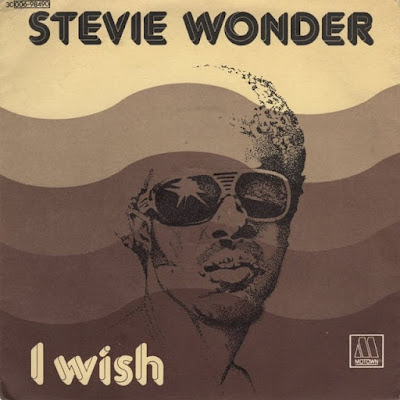According to one of our musical sources:
“Stevie Wonder – “I Wish”
HIT #1: January 22, 1977
STAYED AT #1: 1 week
1976’s Songs In The Key Of Life might be the epitome of the going-for-it album. Stevie Wonder was riding an all-time world-historic hot streak — Where I’m Coming From in 1971, Music Of My Mind and Talking Book in 1972, Innervisions in 1973, Fulfillingness’ First Finale in 1974. He’d signed a new Motown contract that had granted him full artistic control and made him probably the highest-paid recording artist in the world.
In making the album, Wonder retreated into the studio for more than a year, pushing back a scheduled October 1975 release date because he didn’t think it was perfect yet. Before Songs In The Key Of Life finally came out in September of 1976, Motown had printed up “We’re almost finished” T-shirts. Upon its release, Songs In The Key Of Life became only the third album — and the first by anyone other than Elton John — to debut at #1 on the album charts. It’s also a masterpiece. That matters, too. Songs In The Key Of Life is one of those rare hyped-up albums that raises impossible expectations and then actually succeeds them.
Songs In The Key Of Life is a lot to digest: two LPs and a bonus 7″, 21 songs, an hour and 45 minutes. Wonder is deeply in his own zone, crafting these rich and textured soul-jazz meditations that had very little to do with everything else that was happening in pop music in 1976. And yet Wonder trusted the public to go along with him. They did. Songs In The Key Of Life was the third Stevie Wonder album to win the Album Of The Year Grammy, and it sat at #1 for 13 non-consecutive weeks across 1976 and 1977, blocking big albums from people like Rod Stewart, Chicago, and Led Zeppelin.
And yet Stevie Wonder did not release a single from Songs In The Key Of Life until the album had already been out for a couple of months. There could be any number of reasons for that, but I think he held off because he understood that the album was best heard as a sprawling, infinite whole. Maybe Wonder also jacked up album sales by waiting to release a single — something that the record industry would do all over the place in the ’90s, inflating LP sales even for one-hit wonders and wreaking havoc on Billboard tabulation. (We’ll get to all that.) In any case, Wonder’s strategy, if that’s what it was, worked out. Songs In The Key Of Life had mostly finished its run at the top when “I Wish,” the album’s first single, finally made its way to #1.
As Songs In The Key Of Life songs go, “I Wish” is one of the simplest and most direct. It’s a four-minute memory-voyage (shortened slightly in its single version) in which Wonder goes back to his childhood and remembers running around and getting into trouble. He remembers being broke on Christmas but still being happy with his family. He recalls getting caught trying to run around with his “hoodlum friends.” He goes back to getting tattled on for “playing doctor” with a girl, and he brings in his sister Renee Hardaway just to call him a “nasty boy” in a fun little three-word vocal cameo.
There are logistical issues to the storyline. How, for instance, did a blind kid think he was going to sneak out of the house without getting caught? But Wonder keeps things vague. I’m guessing he does that on purpose. His whole life story is so singular, and yet “I Wish” is a relatable song — a tender reminisce on childhood joy from a guy who faced unimaginable hardships during those years and who really didn’t get to be a kid for long. (Wonder was 13 when 1963’s “Fingertips (Pt. II)” became his first #1 hit.) Still, even if Wonder’s storytelling on “I Wish” is a little generic, its pang of longing — the desperation in his voice when he sings about missing those days on the chorus — still rings true. And there’s some hard-earned pride in little details, as in Wonder singing about himself as “a little nappy-headed boy.”
“I Wish” was one of the last songs that Wonder included on Songs In The Key Of Life. He wrote it immediately after having a magical experience at a Motown company picnic in Los Angeles during the summer of 1976. The picnic awakened a lot of childhood memories in Wonder. That same night, he recorded the song. Wonder told Musician, “I had such a good time at the picnic that I went to Crystal Recording Studio right afterward and the vibe came right to my mind — running at the picnic, the contests, we all participated.” A note to all employers: “I Wish” serves as good evidence that worker morale is important. When you put in that extra effort to keep everyone happy, you end up with things like “I Wish.”
“I Wish” is a warm, sprightly funk song, full of horn-riffs and squelchy keyboards. Wonder plays a lot of things himself — the Fender Rhodes, the ARP synthesizer, the drums. His drumming on the record is just absurd — busy and showy but firmly in the pocket. It’s completely fucking mind-boggling that the man could be that good at drums despite drumming maybe not even being one of his top 10 skills. Stuff like that just blows me away. Even as one of the most acclaimed artists of all time, it’s still possible that Stevie Wonder is underrated.
Wonder may have patched together much “I Wish” in the studio, but it still sounds like a full-band workout. A few minutes in, Wonder stops lamenting bygone days and just gets to vamping, keeping the energy up while howling wordlessly, his yips deep in the mix. In all its lush jazziness, “I Wish” isn’t one of Wonder’s best songs or one of his best grooves, and it doesn’t even try to sum up the expansive experience of Songs Of The Key Of Life. But it’s a blast regardless. Wonder will show up in this column a few more times, and Songs In The Key Of Life will be represented again.
GRADE: 9/10
BONUS BEATS: The best-known “I Wish” sample, as you’ve probably already realized, belongs to Will Smith’s “Wild Wild West,” a 1999 song that will eventually appear in this column. (It’s one of two rap songs built from Songs In The Key Of Life samples that hit #1 on the Hot 100 in the ’90s.) So instead, let’s go with Digital Underground’s video for their 1992 single “No Nose Job (Ultra Funk Remix),” which also samples “I Wish”:
(Incredibly, Digital Underground never had a top-10 single. The immortal 1990 classic “The Humpty Dance” peaked at #11, which means I don’t get to give it the score it deserves. But onetime Digital Underground dancer and hypeman 2Pac will eventually appear in this column.)” – Stereogum.com


















